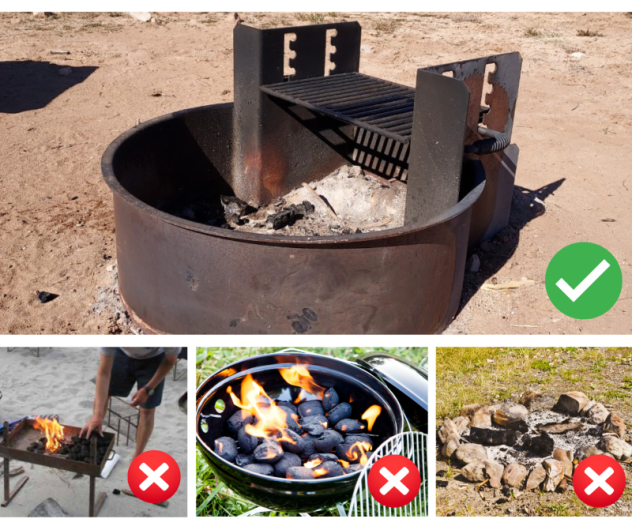Rocky Mountain District Fire Management

Fire management in Colorado is an interagency partnership among federal, state and local entities. BLM-managed lands within Colorado are broken into four Interagency Fire Management Units: Northwest Colorado Fire Unit in Craig, Upper Colorado River Interagency Fire Unit in Grand Junction, Southwest District Fire Unit in Montrose and Rocky Mountain District Fire in Canon City.
Current Fire Restrictions
- Royal Gorge Field Office
Royal Gorge Field Office
Updated December 22, 2023
All fire restrictions within the Royal Gorge Field Office have been lifted
- San Luis Valley Field Office
San Luis Valley Field Office
Updated December 22, 2023
All fire restrictions within the San Luis Valley Field Office have been lifted
Public Land Closures
District specific fire restrictions
(All fire restrictions are current unless the rescission order is posted. Please contact the field office for additional information.)
STAGE 1 FIRE RESTRICTIONS

- Campfires are only allowed within designated fire grates in developed campgrounds (i.e. a metal, in-ground containment structure -- fire pans and rock campfire rings are not acceptable)
- No fires of any type including charcoal outside of developed areas. Devices using pressurized liquid or gas are exempted.
- No smoking except within an enclosed vehicle or building, a developed recreation site or in a barren area free of vegetation.
- No use of explosive materials, including explosive targets.
- No welding or operation of an acetylene or other similar torch with open flame except from an area that has been cleared of vegetation.
- No operation of any internal combustion engine without a spark arresting device properly installed and in working order.
STAGE 2 FIRE RESTRICTIONS
- No campfires or use of specific grills or stoves in any location. Building, maintaining, attending or using a fire or campfire, charcoal grill, coal, wood burning stove or sheepherders stove, including in developed camping and picnic grounds is prohibited. Devices using pressurized liquid or gas are exempted.
- No smoking, except within an enclosed vehicle, trailer or building.
- No use of an explosive requiring a fuse or blasting caps, fireworks, rockets, exploding targets and tracers or incendiary ammunition.
- No use of any internal combustion engine without a spark arresting device properly installed, maintained and in effective working order meeting either:
- (a) Department of Agriculture, Forest Service Standard 5100-1a; or
- (b) Appropriate Society of automotive Engineers (SAE) recommended practice J335(b) and J350(a). 36 CFR 261.52(j)
- No operation of a chainsaw without an approved spark arrestor, and without a chemical pressurized fire extinguisher and a round-point shovel with an overall length of at least 35 inches. The extinguisher will be with the equipment operator. The shovel may be kept with fueling supplies but readily available for use.
No welding or operation of an acetylene or other torch with open flame.
Year-round tips for preventing wildfires:
- Keep campfires small and under control.
- Ensure that campfires are dead out. If it’s too hot to touch, it’s too hot to leave.
- Keep a shovel and water nearby to douse escaped embers.
- Do not park or idle vehicles in tall dry grass. The heat from the vehicle can spark a wildfire.
- Do not allow chains to drag from vehicles or towed trailers.
- Fireworks are never allowed on federally managed lands.
Year-round wildfire prevention measures always apply on BLM-administered public lands in Colorado. These prohibit:
- Leaving a fire unattended or unextinguished.
- Possession, discharge or use of any fireworks.
- Discharging of a firearm using incendiary or tracer ammunition.
- Burning, igniting or causing to burn any tire, wire, magnesium, or any other hazardous or explosive material.
- Operating any off-road vehicle on public lands unless the vehicle is equipped with a properly installed spark arrester pursuant to 43 CFR 8343.1 (c).
